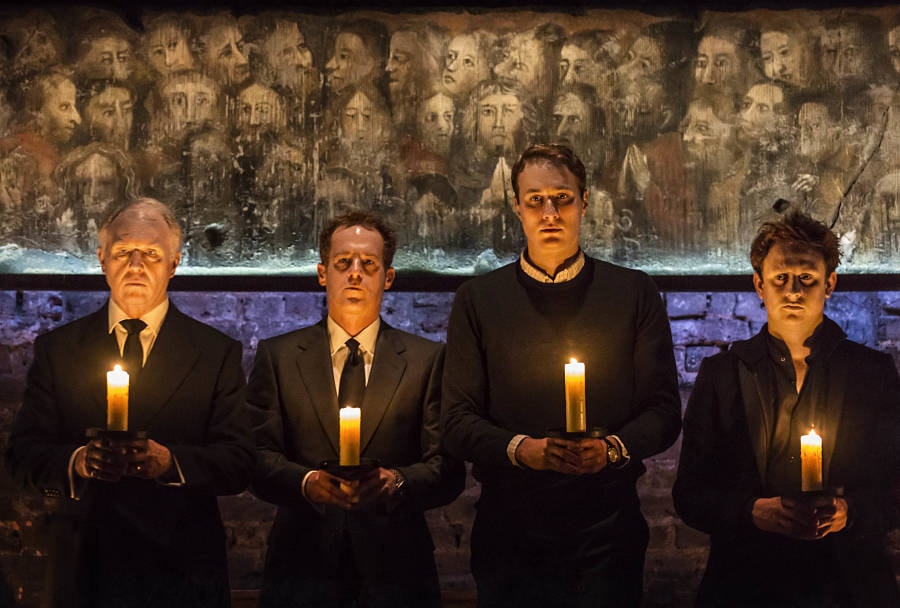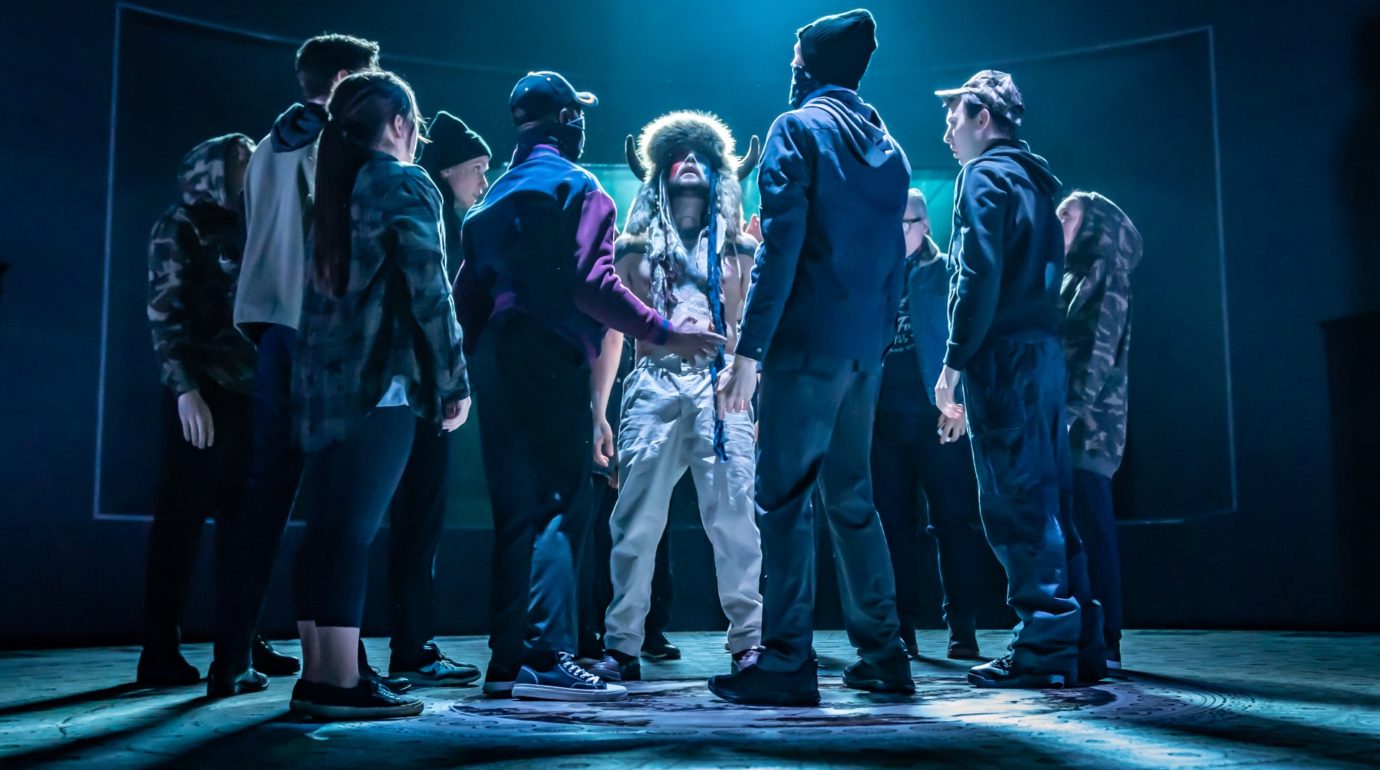Last month, when the Old Vic debuted The 47th, Mike Bartlett’s play imagining the 2024 American election as a contest between Donald Trump and Kamala Harris, more than one British critic felt that the playwright’s use of iambic pentameter bestowed a gravity on the 46th president that he does not deserve. I’d like to point out that those critics did not register a similar complaint when Bartlett employed Shakespearean language in King Charles III, his 2014 play similarly imagining the British royal family’s near future. With that family, they could easily accept blank verse.
But while it may strain credulity that Bartlett’s Trump knows even small details about King George III, Nelson Mandela, and Lin-Manuel Miranda, I think I understand why he chose to write The 47th in Shakespeare’s meter of choice. The language elevates not so much Trump or his offspring (Ivanka, Donald Jr., and Eric, all characters in the play) as it does the dire situation in which the American electorate finds itself. For me and my ilk, the danger the Trumps represent to the country and the globe is a matter of unquestionable gravity. So Shakespeare it up, I say.
The cast clearly enjoys delivering the marked rhythms of the dialogue and the monologues. With her eerily perfect grooming and posture, Lydia Wilson’s Goneril—sorry, Ivanka floats across floors in four-inch stiletto heels as if she were barefoot, flashing her brittle smile at odd moments in the middle of sentences, like an alien imitating a live human. As Harris, the American actor Tamara Tunie holds her ground by conveying a deeply rooted humility in the face of outlandish showboating.
As Trump, Bertie Carvel rules the stage, as he must, with a physicality as intimidating as it is riveting. He easily dispenses the well-known gestures: the preening Mussolini chin thrust, the ready grin and thumbs-up sign, and the strangely toe-centric stance in which the thrusting bulk of the torso threatens to tip the whole body forward to the ground. But this is no mere impression. As Trump, Carvel—who has played everything from a philandering husband on Bartlett’s BBC series Dr. Foster to the tyrannical Miss Trunchbull in the original cast of Matilda the Musical—is the embodiment of a never-dormant need for attention of any kind. He captures the sense of completion Trump feels in front of a MAGA crowd, when every eye is on him. All he wants to do is to live his life in front of that crowd.
In a way, The 47th becomes the objective correlative of our current situation: The scenes featuring Trump are ostensibly more captivating than the ones in which Harris wrestles with the job of remaining decent when her opponent respects no civilized norm. Bartlett has said he hopes the play will come to the U.S.; he wants to see how it plays in front of an American audience. (At the moment, there are no firm plans to move the cast to New York.)
Bartlett is in the unusual position of having three plays running simultaneously in London: a West End revival of Cock, his 2009 play about a man who can’t chose between a male and female lover, runs until June 4 at Ambassadors Theatre, and another new play, Scandaltown, opened recently at the Lyric Hammersmith. Written in the style of a Restoration comedy, Scandaltown is a big-hearted depiction of the ongoing generational battle between recalcitrant oldsters and the exuberant young who want to forge a better and fairer world in part by forcing a wholesale change in the way we use language and manners.
The play runs at the Old Vic through May 28. I recently spoke with Bartlett via Zoom.

LAURIE WINER: Was your first problem, after conceiving The 47th, exactly how to give people as insipid as the Trumps this grand way of speaking? How much knowledge can you bestow on them? Your Trump quotes easily from Richard II, for instance. Did you feel the formality of the language would underline the seriousness of the situation in which the electorate finds itself?
MIKE BARTLETT: For me that’s not the problem, that’s the fun part. Trump is the entertainer-in-chief. That’s his talent, that he gets everybody interested and excited. I wanted to put that entertainer in a theatre with a live audience, and give him his due, make him captivating and entertaining—and dangerous. If he speaks in iambic pentameter and has a cultural fluency that he doesn’t have in real life, what he does have is the ability to hold a crowd and influence them. People have described the play as a comedy, but I didn’t write it as a comedy. I wrote it more as a tragedy. But I needed to make him as entertaining or as interesting as people find him in real life.
So what was the problem of writing the play?
The problem is often what makes the play, what becomes the engine of the play. The problem of this play was how to prevent Trump from taking it over. He wants the play to be about him, he wants to stroll into every scene and blow everyone out of the water. That’s his desire. It’s also exactly the problem that democracy has in America, and here as well—we have our entertainer-in-chief, who made his name on panel shows and the BBC, and who will say anything and deliberately lie to get attention. It’s the same dynamic. So the problem that drove the play is, what does Kamala do to hold our attention in order to defeat this guy? In a world of clicks, where people’s interests are split a million ways, how do you hold the public’s interest if you are sincere and principled? It’s a real challenge for the left at the moment.
Will the play come to the U.S.?
We don’t know yet, but I would love for it to come to the U.S. With King Charles the III, which transferred to Broadway in 2015, it was almost two different plays. When we did it here, people had a really strong emotional connection to it. There were moments of total silence and of people being very moved by it and arguing about it and taking it quite seriously. When we did it on Broadway, the audience was much more objective, and people laughed a lot more, because it’s not their royal family. With this we have the opposite issue. The Old Vic audience is treating it like a comedy. It can be funny from beginning to end. But I didn’t write it to laugh at Donald Trump, because we’ve done a lot of that, but to try and discuss what’s happening with American democracy, what the danger of that is, what the horror of that is, and how on earth we defeat it.
It doesn’t bother you that the London audiences find it funny?
No. Some people here say they feel a bit triggered to be in the presence of Bertie as Trump, and they don’t want to laugh, and I think that’s fine. I don’t write a play to get a specific reaction. One of the things that I’ve missed about theatre is that you put something onstage, and every audience’s reaction is different, and they can discuss it among themselves. Some nights one section of the audience laughs and another section can’t believe they laughed at that. You don’t get that sitting at home watching Netflix.

What did you and director Rupert Goold advise the actors, in terms of how much they should do an impersonation vs. inhabiting their roles?
What King Charles III taught us is that you just need a few signature gestures—when Tim Pigott-Smith played with the ring on his finger, that gave you a sense of Charles without his having to do an impression all the time. I think you can see that with Bertie, the way he holds his hands down by his side, you get signature bits, which gives him latitude to play the part rather than the person. The idea is to embody the part as if you were doing Richard III—you might spend some time figuring out who the real person was, but you’d spend a lot more time on the text figuring out what the words require of you.
When playing a baddie, Bertie completely throws himself into the role and he doesn’t judge the character. And he doesn’t hold back. He gets inside these characters, but he doesn’t ask you to forgive the bad things they’ve done, not at all. He is brilliant at that. So I think you do understand the psychology of Trump without softening the edges. Never for a moment, do we go, “Oh, maybe we’ve misjudged Trump, maybe he’s not so bad.” And I wouldn’t want anyone to think that. And also, remember that the play is not called Donald Trump—it’s called The 47th. The title tells you who the protagonist is.
Did you do a close study of Trump’s speech patterns?
I feel like the last six years have been a close study. For me there was more study of Kamala and Ivanka, because I’d seen less of them. But this is not a journalistic piece, it’s not a naturalistic depiction of Trump. What I’m looking for—and this was true with Charles as well—is what are the key psychological principles of each character, what’s driving them, what do they want, what’s the thing they need that they don’t have, and what is it they think they want, all those sorts of questions. That gives me story and drama. So for Trump, one of the big questions is, how does he feel about death? He’s getting on, he’s not getting younger. So how does a man like that, who wants the world to revolve around him, how does he think about the end of him? And that’s a really interesting engine to drive a play.
In both of your new plays, you use forms that allow the characters to speak directly to the audience. What, as a playwright, do you gain by that?
In the Shakespearean mode you get to move from the individual to what’s happening in society, to link what’s happening in the body politic to actual bodies. That’s why Shakespeare would write about kings. Also, you can talk in metaphor without it seeming hokey or overblown, as it would if you are stuck in naturalism. In Restoration comedy, the purpose is to engage in the double storytelling of what someone presents as and what they really are. And the audience participates in that. I would love to move that forward and find contemporary versions of these old forms so that we’re not stuck in naturalism. We still default to naturalism because we think it’s more truthful. I just don’t think that theatre truth works best in that way.
I found the scene with the Shaman and the mob, which recalls the Jan. 6 insurrection, bone-chilling. It’s the first time I’ve seen those events dramatized, and it was every bit as horrific as one would desire.
If we did another draft for another production, I could lean into that more in the text possibly. But what I love is that it’s a visual representation of a spiritual dark side of America. The thing we have to contend with is how deeply felt these views are. And they’re not just views—they’re about people’s core identity, about who people are and what hill they are they prepared to die on. Whereas previously the country was held together by an idea of governing and statesmanship, the idea that you rise above your own party, you rise above your own self and you serve the country. Now you see very little of that.
So in this play I take an imaginative leap and ask, how bad can it get? Journalists are understandably reluctant to take that leap; let’s face it, journalists are not encouraged to use their imaginations. That’s not part of their job description, but it is part of mine. So what I try to do is take the threads of reality and pursue them logically. Given that we know what Trump did after he lost the election and how much he tried to seize power back, what on earth could he do in the run-up to the next election, given that he has nothing to lose? If you ask that question, you don’t have to go very far before it’s pretty terrifying. So if the audience asks itself that, that’s good for me, that’s what the play should be doing.
King Charles III was about the ongoing legacy of the English civil war, with the monarchy vs. the government, and on some level it feels like this is about the ongoing legacy of the American Civil War. I love the idea of America as a project, but there are deep unresolved issues going way back. And now, with the Supreme Court throwing the issue of abortion back to the states, these issues are obviously very present.

Will this play outlive its moment?
This play is about now. At some point events will overtake it and then it will become an alternative history, what could have been. But the great thing about theatre is that you can make it quickly. With movies and TV it takes two years to go from writing it to an audience seeing it, but in theatre we can comment on events as they are now. The important thing is always what happens in the theatre tonight. So if events change I can rewrite it and we can re-rehearse it. And if we were to do the play again, I would take it up to where we are at that point. I love that. I love that theatre is about right now. That’s what theatre should be doing: It should be a part of your life. So, yeah, it may well have a legacy problem, but that’s not what I’m thinking about.
I’m wondering about how the two battles you depict in your two new plays intersect for you. In Scandaltown, there is a battle for a new way of speaking and acting to make a better and fairer world. The 47th is about how we fight what seems to be a growing global attraction to nationalism and authoritarianism.
The thing that connects them for me is extreme capitalism. I read that Steve Bannon is really pleased that the left is talking about identity politics, because it means they haven’t got their eye on the ball in terms of economics. So the right can take over while the left is arguing about their identities. It’s a hard thing to talk about because those issues are massively important. What I hope is clear in Scandaltown is my amazement at a generation making such a radical social change so quickly in terms of gender and ethnicity. I’m in my 40s, and when I was at university we were having all those conversations about gender and race and post-colonialism, but we didn’t do anything about it. We knew all the theories, but nothing happened. Now all of that is bursting into the everyday. And it’s still settling—there are still things that don’t make any sense because so much of it is new. The speed of the change is bracing and brilliant but also quite difficult for people; you’re asking people who have lived 40, 50, 60 years in one reality to suddenly speak in a different way and act in a different way. Maybe they should, but that’s quite an ask, to ask people to change that quickly. And what we’re seeing is people having a desire to change but struggling. But ’twas ever thus, the young generation telling the old what they need to do.
A lot of my work is about what happens when capitalism runs amok. When that happens, humanity goes out the window. Capitalism will just run across the individual and all their hopes and dreams. The benefits of social media and the connection it provides is fantastic, but they are run by for-profit companies, and we are the product and we need to keep that in mind. And I don’t trust them as far as I can throw them.
What would you like to say to an American audience that would like to see The 47th, should we come?
To an American audience I would say, it is humbly written as an outsider, observing. But an observer who’s been steeped in American culture since I was a child, as we are in this country. I would invite the American audience to come and to have a conversation about this subject, and to have any response. People often ask, what do you want the audience to leave with, what’s your message? I don’t think that’s what theatre is about; it’s about a conversation in the auditorium on a subject that we haven’t reached a consensus on and that we’re all thinking about. Hopefully we’re having a good time, but it’s about us all thinking about it in the room together. It’s not me lecturing Americans about America. I wouldn’t dare!
Laurie Winer’s book Oscar Hammerstein II and the Invention of the Musical will be published by Yale University Press in January.


